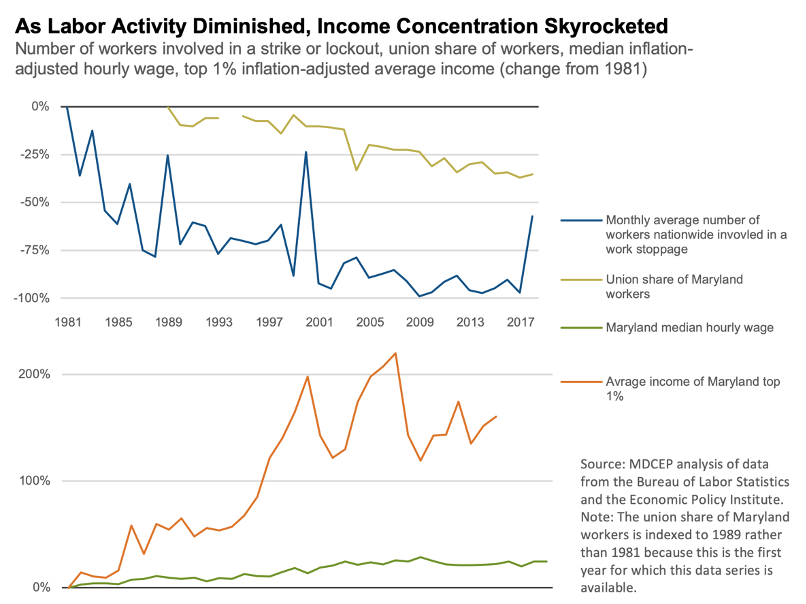Policymakers Should Stand by the Essential Workers Who Sustain Maryland Communities
Workers at Amazon, Instacart, and Target walked off the job on May 1 to protest inadequate pay, safety measures, and other basic protections. The COVID-19 pandemic has vividly illustrated the vital role grocery workers, delivery workers, and others in service-industry jobs play in supporting Maryland communities—and the chasm between this role and the paltry pay these workers take home. Maryland policymakers should respond to these workers’ concerted action by strengthening the standards we expect all jobs to meet.
The aggressive steps policymakers in Maryland and in most other states have taken to save lives amid the novel coronavirus pandemic have caused severe economic upheaval, worsened by the federal government’s deeply inadequate economic policy response. Widespread business closures have cost nearly 400,000 Marylanders their jobs—creating heavily lopsided burdens—but increased reliance on at-home delivery services has driven a spike in demand for companies like Amazon and Instacart. But even as grocery, warehouse, and delivery workers have put food on Marylanders’ tables—and driven record stock prices for their employers—their pay often remains too low to support a basic standard of living anywhere in Maryland. Worse yet, many workers are forced to work without the necessary safety measures to protect them from coronavirus infection.
Many workers’ decision to strike on May 1 is in line with research showing that the right to slow or halt production plays an important role in improving wages and working conditions—and some of the biggest benefits often accrue to women and workers of color. But as aggressive corporate lobbying and lopsided policy choices over the last 50 years have weakened workers’ bargaining power, strike activity as well as typical families’ share of the economic pie have shrunk. Unfortunately, lopsided laws on the books today put most authority to strengthen workers’ bargaining power exclusively in the hands of the federal government.
However, state-level policy can improve safety, working conditions, and pay in essential jobs. Maryland lawmakers have already taken positive steps by guaranteeing most workers the right to earn paid sick days and by gradually raising the state’s minimum wage to $15 per hour. They should build on these steps to ensure the people whose work supports Maryland communities are also able to support their families:
- Strengthen our minimum wage law. The 2019 legislation to gradually increase Maryland’s minimum wage to $15 was a major step forward, but amendments to the bill excluded several categories of worker such as tipped workers, farm workers, and young workers. We should eliminate these carve-outs and index the minimum wage to ensure that it does not automatically erode over time.
- Strengthen our sick days law. We can make similar improvements to Maryland’s earned sick days law. As enacted, the law leaves some workers out entirely and guarantees others only unpaid sick days. Some of the law’s benefits have been temporarily extended to more workers. The public health case for guaranteeing every worker the right to earn paid sick days has never been more clear.
- Pass paid family and medical leave. Today, the vast majority of Maryland workers face potentially ruinous income losses if they need to take a more extended period off work to recover from a major illness, care for an ill family member, or care for a new child. Establishing universal paid family and medical leave insurance would ensure that no one faces this impossible choice—and would protect us all from the fallout of counterproductive labor policies.
- Protect workers’ right to speak up. Some of Maryland’s job standards lack basic protections against retaliation—making it next to impossible for workers to exercise their rights at work. We should close these loopholes as well as guarantee workers the right to refuse tasks that put them in needless danger.

